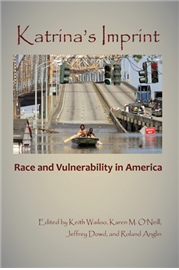Pain: A Political History
"I wasn't sure what a palliative care doctor was doing reading about the political history of pain, but I soon found it hard to put down... Anyone who works in palliative care and has a broader interested in the political and legal aspects of pain management and physician-assisted suicide will enjoy this book." — Roger Woodruff - International Association for Hospice and Palliative Care
Introduction. Between Liberal Relief and Conservative Care
1. The Trojan Horse of Pain
2. Opening the Gates of Relief
3. The Conservative Case against Learned Helplessness
4. Divided States of Analgesia
5. OxyContin Unleashed
Conclusion. Theaters of Compassion
"In this remarkable book, Keith Wailoo explores the long American struggle over pain. Liberals feel your pain. Conservatives fear entitlement and welfare. Wailoo traces the conflict from the battlefields of World War II to the rise of deregulation, from fetal pain to OxyContin. Beautifully written, broad ranging, deep, wise, unexpected, and endlessly fascinating." James A. Morone, Brown University
In this history of American political culture, Keith Wailoo examines why and how pain and compassionate relief has been a battleground for defining the line between society's liberal trends and conservative tendencies. Tracing the development of pain theories in politics, medicine, law, and society, and battles over the morality and economics of relief, Wailoo points to a tension at the heart of the conservative-liberal divide.
Beginning with the post–World War II emergence of a pain relief economy in response to concerns about recovering soldiers, Wailoo explores the 1960s rise of an expansive liberal pain standard, along with the emerging conviction that subjective pain was real, disabling, and compensable. These concepts were attacked during the Reagan era of the 1980s, when a conservative political backlash led to decreasing disability aid and the growing role of the courts as arbiters in the liberal-conservative struggle to define pain.
How Cancer Crossed the Color Line
Introduction. Health Awareness and the Color Line
1. White Plague
2. Primitive's Progress
3. The Feminine Mystique of Self-Examination
4. How the Other Half Dies
5. Between Progress and Protest
6. The New Politics of Old Differences
Conclusion. The Color of Cancer
"Offers a stunning historical account of the dramatic shifts in popular and epidemiological consciousness about cancer and racial difference." Michael Omi, University of California, Berkeley
"A masterful account of how the reward structures of science funding, the profession of medicine, era-specific cultural stereotypes of women's 'proper place,' and shifting notions of racialized bodies have all converged to shape our views of who is at risk of cancer, and why." Troy Duster, New York University

Dying in the City of the Blues
"Imaginative and sophisticated, yet readable and accessible, this is a book that will find a diverse and enthusiastic audience. It is easy enough to invoke something called the social construction of disease, but much harder to use that concept as a tool for historical and sociological analysis. Wailoo has done just that... to illuminate American society in a powerful and original way." Charles Rosenberg, Harvard University
This groundbreaking book chronicles the history of sickle cell anemia in the United States, tracing its transformation from an "invisible" malady to a powerful, yet contested, cultural symbol of African American pain and suffering.
Introduction. Pain and Suffering in Memphis
1. Conjurors of Health in the New South
2. Race Pathologies, Apparent and Unseen
3. Remaking Jim Crow Medicine
4. The Commodification of Black Health
5. Sickled Cells, Black Identity, and the Limits of Liberalism
6. Promising Therapy on Beale Street
7. Pain and Policy at the Crossroads of Managed Care
Conclusion. Race Against Disease
Set in Memphis, home of one of the nation's first sickle cell clinics, Dying in the City of the Blues reveals how the recognition, treatment, social understanding, and symbolism of the disease evolved in the twentieth century, shaped by the politics of race, region, health care, and biomedicine. Using medical journals, patients' accounts, black newspapers, blues lyrics, and many other sources, Keith Wailoo follows the disease and its sufferers from the early days of obscurity before sickle cell's "discovery" by Western medicine; through its rise to clinical, scientific, and social prominence in the 1950s; to its politicization in the 1970s and 1980s. Looking forward, he considers the consequences of managed care on the politics of disease in the twenty-first century.
A rich and multilayered narrative, Dying in the City of the Blues offers valuable new insight into the African American experience, the impact of race relations and ideologies on health care, and the politics of science, medicine, and disease.
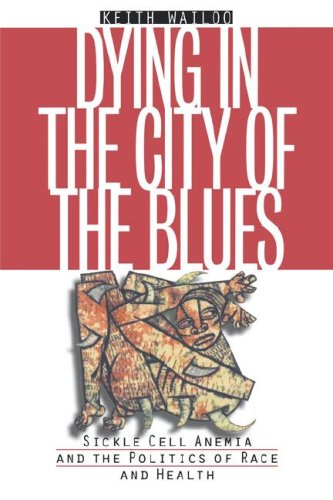
The Troubled Dream of Genetic Medicine
"No book brings together contemporary understandings of genetics as a social rather than a biological project as nicely..." Kaja Finkler, University of North Carolina at Chapel Hill
The Troubled Dream of Genetic Medicine: Ethnicity and Innovation in Tay-Sachs, Cystic Fibrosis, and Sickle Cell Disease (Johns Hopkins University Press, 2006) co-authored with Stephen Pemberton
Why do racial and ethnic controversies become attached, as they often do, to discussions of modern genetics? How do theories about genetic difference become entangled with political debates about cultural and group differences in America? Such issues are a conspicuous part of the histories of three hereditary diseases: Tay-Sachs, commonly identified with Jewish Americans; cystic fibrosis, often labeled a "Caucasian" disease; and sickle cell disease, widely associated with African Americans.
In this captivating account, historians Keith Wailoo and Stephen Pemberton reveal how these diseases—fraught with ethnic and racial meanings for many Americans—became objects of biological fascination and crucibles of social debate. Peering behind the headlines of breakthrough treatments and coming cures, they tell a complex story: about different kinds of suffering and faith, about unequal access to the promises and perils of modern medicine, and about how Americans consume innovation and how they come to believe in, or resist, the notion of imminent medical breakthroughs.
With Tay-Sachs, cystic fibrosis, and sickle cell disease as a powerful backdrop, the authors provide a glimpse into a diverse America where racial ideologies, cultural politics, and conflicting beliefs about the power of genetics shape disparate health care expectations and experiences.
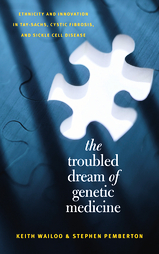

The Cultural Politics of Disease
Drawing Blood
"Boldly and skillfully... analyzes not only the role of physicians but of research hospitals and pharmaceutical companies... shows how race, gender, and lifestyle influence how physicians defined and responded to the very diseases that were called into existence by the new technologies they employed... a major contribution to the social history of medicine." James H. Jones, American Historical Review
"First class history at many levels.. can be read with profit and pleasure by the clinician, historian, non-medical scientist, and interested layperson." John Truman, M.D., Science
Drawing Blood: Technology and Disease Identity in Twentieth-Century America (Johns Hopkins University Press, 1997)
In Drawing Blood, medical historian Keith Wailoo uses the story of blood diseases to explain how physicians in this century wielded medical technology to define disease, carve out medical specialties, and shape political agendas. As Wailoo's account makes clear, the seemingly straightforward process of identifying disease is invariably influenced by personal, professional, and social factors—and as a result produces not only clarity and precision but also bias and outright error.
Drawing Blood reveals the ways in which physicians and patients as well as the diseases themselves are simultaneously shaping and being shaped by technology, medical professionalization, and society at large. This thought-provoking cultural history of disease, medicine, and technology offers an important perspective for current discussions of HIV and AIDS, genetic blood testing, prostate-specific antigen, and other important issues in an age of technological medicine.
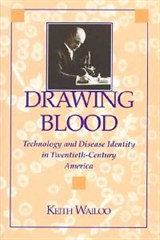
Three Shots at Prevention
"Masterfully insightful and astute. This is a vital new text... a significant resource for debate within the policymaking arena." Dorothy Porter, University of California, San Francisco
In 2007, Texas governor Rick Perry issued an executive order requiring that all females entering sixth grade be vaccinated against the human papillomavirus (HPV), igniting national debate that echoed arguments heard across the globe over public policy, sexual health, and the politics of vaccination. Three Shots at Prevention explores the contentious disputes surrounding the controversial vaccine intended to protect against HPV, the most common sexually transmitted infection.
When the HPV vaccine first came to the market in 2006, religious conservatives decried the government's approval of the vaccine as implicitly sanctioning teen sex and encouraging promiscuity while advocates applauded its potential to prevent 4,000 cervical cancer deaths in the United States each year. Families worried that laws requiring vaccination reached too far into their private lives. Public health officials wrestled with concerns over whether the drug was too new to be required and whether opposition to it could endanger support for other, widely accepted vaccinations. Many people questioned the aggressive marketing campaigns of the vaccine's creator, Merck & Co. And, since HPV causes cancers of the cervix, vulva, vagina, penis, and anus, why was the vaccine recommended only for females? What did this reveal about gender and sexual politics in the United States? With hundreds of thousands of HPV-related cancer deaths worldwide, how did similar national debates in Europe and the developing world shape the global possibilities of cancer prevention?
This volume provides insight into the deep moral, ethical, and scientific questions that must be addressed when sexual and social politics confront public health initiatives in the United States and around the world.
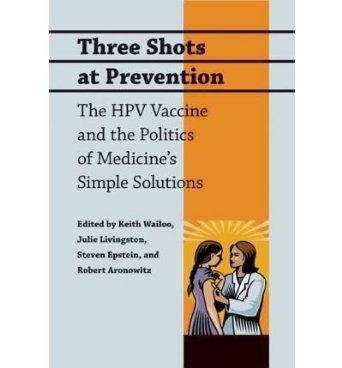
Genetics and the Unsettled Past
"Few collections have so successfully straddled the divide between biology and humanities in relation to race. This work will be widely read and cited." Jay Kaufman, McGill University
"This sterling... collection probes the political and historical meanings of DNA, shaping our understandings of human connections and ourselves... a masterpiece." Susan Reverby, Wellesley College
Genetics and the Unsettled Past: The Collision of DNA, Race, and History (Rutgers University Press, 2012) Edited by Keith Wailoo, Alondra Nelson and Catherine Lee.
Our genetic markers have come to be regarded as portals to the past. Analysis of these markers is increasingly used to tell the story of human migration; to investigate and judge issues of social membership and kinship; to rewrite history and collective memory; to right past wrongs and to arbitrate legal claims and human rights controversies; and to open new thinking about health and well-being. At the same time, in many societies genetic evidence is being called upon to perform a kind of racially charged cultural work: to repair the racial past and to transform scholarly and popular opinion about the "nature" of identity in the present.
Genetics and the Unsettled Past considers the alignment of genetic science with commercial genealogy, with legal and forensic developments, and with pharmaceutical innovation to examine how these trends lend renewed authority to biological understandings of race and history.
This unique collection brings together scholars from a wide range of disciplines--biology, history, cultural studies, law, medicine, anthropology, ethnic studies, sociology--to explore the emerging and often contested connections among race, DNA, and history. Written for a general audience, the book's essays touch upon a variety of topics, including the rise and implications of DNA in genealogy, law, and other fields; the cultural and political uses and misuses of genetic information; the way in which DNA testing is reshaping understandings of group identity for French Canadians, Native Americans, South Africans, and many others within and across cultural and national boundaries; and the sweeping implications of genetics for society today.
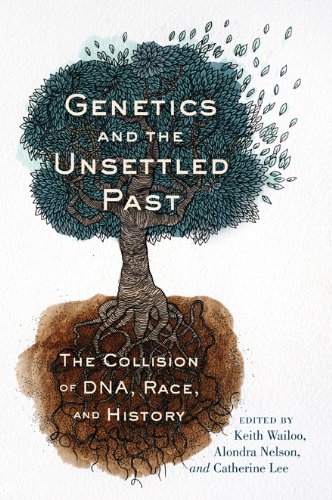
A Death Retold
"The linchpin for this remarkable set of essays is the death of an illegal immigrant due to a 'botched' transplant... Contributors raise vexing questions about medical citizenship, human rights and justice, and the global activity of organ tourism and trafficking." Margaret Lock, author of Twice Dead: Organ Transplants and the Reinvention of Death
In February 2003, an undocumented immigrant teen from Mexico lay dying in a prominent American hospital due to a stunning medical oversight—she had received a heart-lung transplantation of the wrong blood type. In the following weeks, Jesica Santillan's tragedy became a portal into the complexities of American medicine, prompting contentious debate about new patterns and old problems in immigration, the hidden epidemic of medical error, the lines separating transplant "haves" from "have-nots," the right to sue, and the challenges posed by "foreigners" crossing borders for medical care.
This volume draws together experts in history, sociology, medical ethics, communication and immigration studies, transplant surgery, anthropology, and health law to understand the dramatic events, the major players, and the core issues at stake. Contributors view the Santillan story as a morality tale: about the conflicting values underpinning American health care; about the politics of transplant medicine; about how a nation debates deservedness, justice, and second chances; and about the global dilemmas of medical tourism and citizenship.
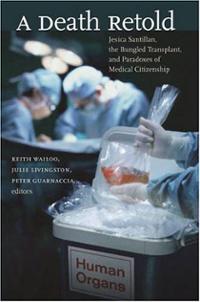
Katrina's Imprint
"the best treatment we have of the American catastrophe called Katrina... the most formidable challenge to each of us in regard to race and justice." Cornell West
Katrina's Imprint highlights the power of this sentinel American event and its continuing reverberations in contemporary politics, culture, and public policy. Published on the fifth anniversary of Hurricane Katrina, the multidisciplinary volume reflects on how history, location, access to transportation, health care, and social position feed resilience, recovery, and prospects for the future of New Orleans and the Gulf region. Essays examine the intersecting vulnerabilities that gave rise to the disaster, explore the cultural and psychic legacies of the storm, reveal how the process of rebuilding and starting over replicates past vulnerabilities, and analyze Katrina's imprint alongside American's myths of self-sufficiency. A case study of new weaknesses that have emerged in our era, this book offers an argument for why we cannot wait for the next disaster before we apply the lessons that should be learned from Katrina.
